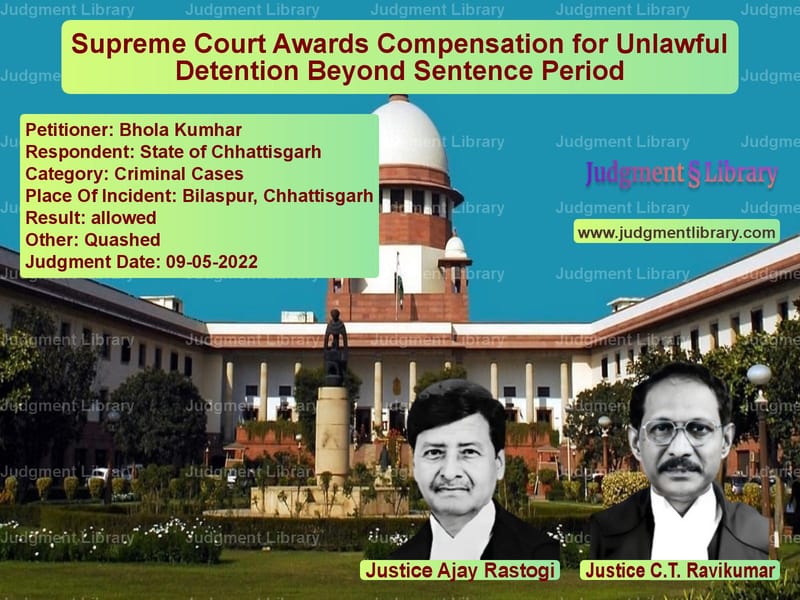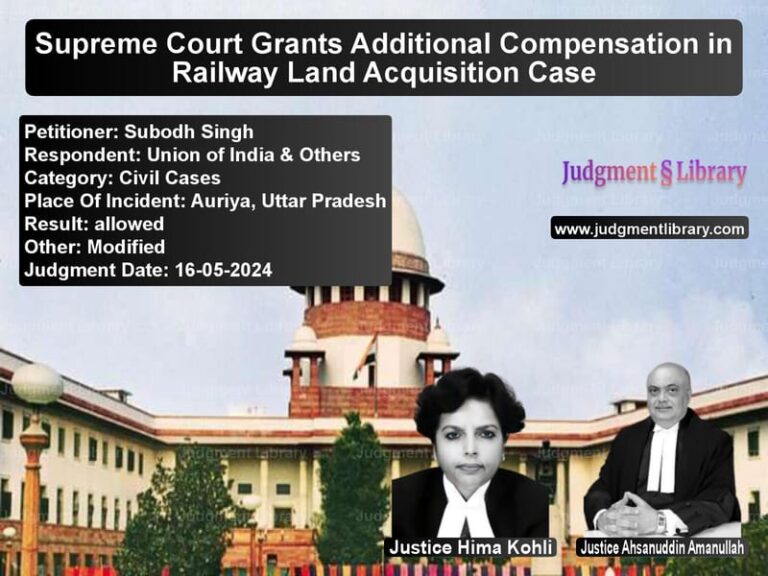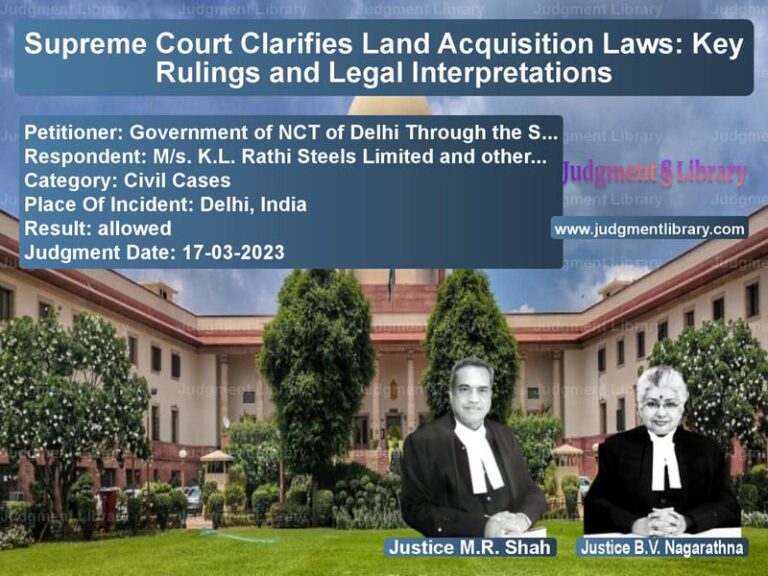Supreme Court Awards Compensation for Unlawful Detention Beyond Sentence Period
The Supreme Court of India recently ruled in favor of Bhola Kumhar, who was unlawfully detained beyond his legally mandated sentence period. The case, Bhola Kumhar vs. State of Chhattisgarh, highlights the importance of protecting the fundamental right to personal liberty under Article 21 of the Constitution. The Court found that the petitioner was wrongfully kept in prison beyond his reduced sentence term and awarded him monetary compensation.
Background of the Case
Bhola Kumhar was convicted under Section 376 of the Indian Penal Code (IPC) and sentenced to 12 years of rigorous imprisonment by the Special Judge in Jashpur, Chhattisgarh. He appealed to the Chhattisgarh High Court, which upheld his conviction but reduced his sentence to 7 years in its judgment dated July 19, 2018. Despite this, he remained imprisoned beyond his reduced sentence period.
The timeline of key events in the case:
- 2015: Convicted and sentenced to 12 years of rigorous imprisonment.
- July 19, 2018: The High Court reduced the sentence to 7 years.
- March 2022: It was discovered that Bhola Kumhar was still in prison despite completing his reduced sentence.
- March 16, 2022: He was released from prison after the Supreme Court intervened.
- May 9, 2022: The Supreme Court ruled in favor of the petitioner and awarded compensation.
Key Legal Issues
- Whether the State was liable for unlawfully detaining the petitioner beyond his legally reduced sentence period.
- Whether the petitioner was entitled to compensation for the deprivation of his fundamental right to liberty.
- Whether prison authorities were negligent in failing to update their records following the High Court’s judgment.
Arguments by the Petitioner (Bhola Kumhar)
The petitioner contended that:
- His continued detention beyond his reduced sentence was unlawful and violated his fundamental rights.
- Prison authorities failed to update their records to reflect the High Court’s decision.
- His wrongful imprisonment resulted in mental agony and economic hardship, warranting compensation.
- The failure of the State to ensure his timely release was a gross violation of Article 21 of the Constitution.
Counterarguments by the Respondent (State of Chhattisgarh)
The State attempted to justify the extended imprisonment by claiming:
- The petitioner had not paid the compensation amount of ₹15,000 imposed by the High Court.
- The sentence was legally extended due to non-payment of the fine.
- The failure to update prison records was an administrative oversight, not an intentional violation.
Supreme Court’s Observations
1. Violation of Article 21 Due to Unlawful Detention
“Imprisonment or detention sans sanction of law would violate Article 19(d) as well as the right under Article 21 of the Constitution of India.”
The Court held that the petitioner’s detention beyond his legally permitted sentence was an unconstitutional deprivation of liberty.
2. Prison Authorities Acted Negligently
“The respondent is attempting to justify the detention of the appellant beyond the period of imprisonment awarded by the High Court… This kind of levity cannot be viewed with laxity.”
The Supreme Court criticized the prison authorities for their failure to ensure the petitioner’s timely release.
3. Compensation for Violation of Fundamental Rights
“Considering the fact that the appellant is a youth, this long and illegal imprisonment beyond the period of sentence… we are of the view that the appellant is entitled to be compensated in terms of money.”
The Court emphasized that wrongful detention causes psychological and economic hardship, making compensation necessary.
Final Judgment
The Supreme Court ruled:
- The wrongful detention violated the petitioner’s fundamental rights.
- The State of Chhattisgarh was directed to pay ₹7.5 lakh as compensation to the petitioner.
- The State was given liberty to recover the amount from responsible officers.
- Future measures must be implemented to prevent similar instances of unlawful detention.
Impact of the Judgment
This ruling has significant implications:
- Prevention of Unlawful Detentions: The judgment reinforces the duty of prison authorities to update records promptly.
- Protection of Fundamental Rights: The ruling affirms that illegal detention is a violation of Article 21.
- Accountability of State Officials: Government officers can be held responsible for negligence in handling sentence records.
- Legal Recourse for Detainees: The ruling provides a precedent for compensating victims of wrongful detention.
By delivering this judgment, the Supreme Court has reinforced the fundamental right to liberty and ensured that no individual is detained beyond their legally permitted sentence.
Petitioner Name: Bhola Kumhar.Respondent Name: State of Chhattisgarh.Judgment By: Justice Ajay Rastogi, Justice C.T. Ravikumar.Place Of Incident: Bilaspur, Chhattisgarh.Judgment Date: 09-05-2022.
Don’t miss out on the full details! Download the complete judgment in PDF format below and gain valuable insights instantly!
Download Judgment: bhola-kumhar-vs-state-of-chhattisgar-supreme-court-of-india-judgment-dated-09-05-2022.pdf
Directly Download Judgment: Directly download this Judgment
See all petitions in Custodial Deaths and Police Misconduct
See all petitions in SC/ST Act Case
See all petitions in Judgment by Ajay Rastogi
See all petitions in Judgment by C.T. Ravikumar
See all petitions in allowed
See all petitions in Quashed
See all petitions in supreme court of India judgments May 2022
See all petitions in 2022 judgments
See all posts in Criminal Cases Category
See all allowed petitions in Criminal Cases Category
See all Dismissed petitions in Criminal Cases Category
See all partially allowed petitions in Criminal Cases Category







